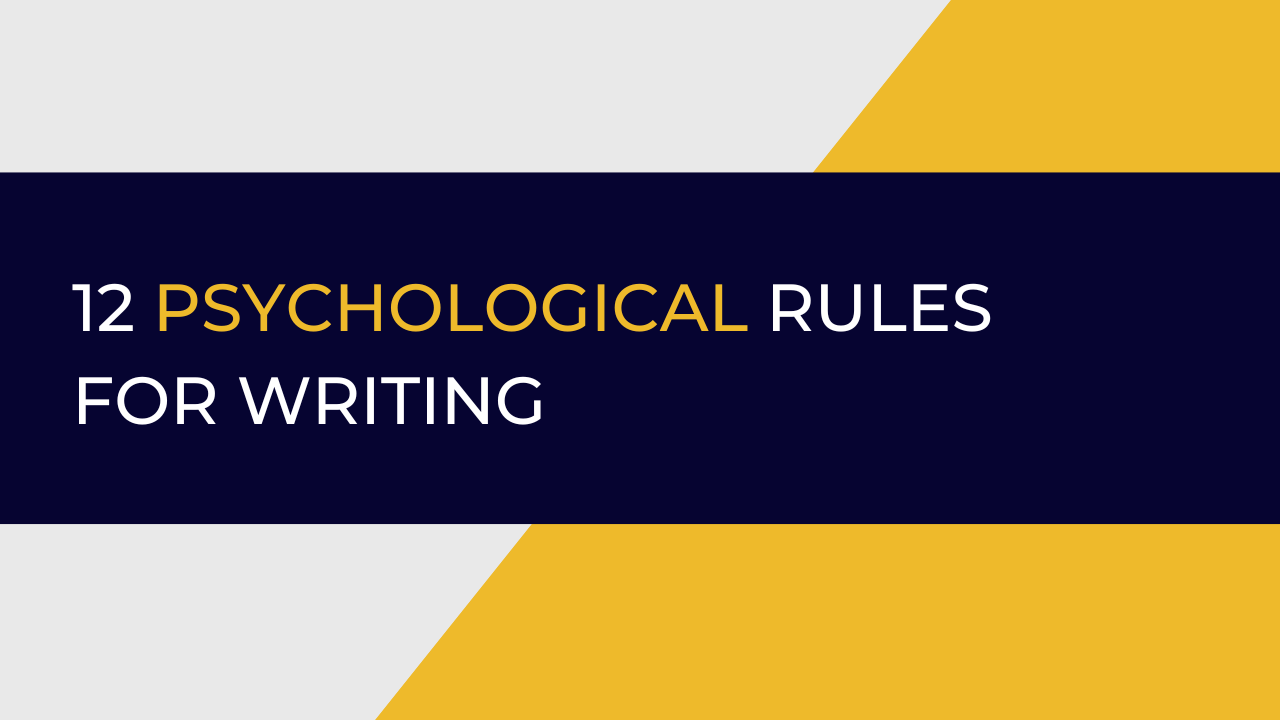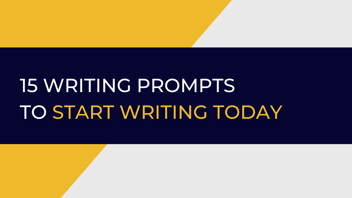How to Use Psychology in Writing: 12 Rules
Writing has more to do with psychology than it does with language. This statement may enrage some writers, but it is true.
Needless to say, writing can't happen without language.
Language, however, is only half the battle. (Maybe even less!)
In reality, people don't read books and pieces of content because they use pretty words. They read them because, for one reason or another, they feel psychologically compelled.
Psychology: The Missing Link
In university, I studied English literature and professional writing. And don't get me wrong, I loved every minute I spent taking that degree. I learned a lot of things, many of which I still use daily. But there is something that degree didn't teach me—or at least it greatly understated its importance.
And that, indeed, is psychology.
In this article, I am sharing 12 psychological rules you need to remember. Whether you're writing a book, blog articles, or even social media posts, these rules will increase interest in your writing.
I've learned these rules over a decade of professional writing and studying the world. These rules do not come from my academic studies; they come from over a decade of observations and experiments.
Since 2016, I have written, revised, or edited over 15 million words across genres and disciplines. (That's only what my Grammarly account has tracked.)
So, if you're ready, let's dive right in!
Table of Contents
1. People are desensitized.
2. People are emotional.
3. People are naturally optimistic.
4. People enjoy living vicariously.
5. People love to compare themselves.
6. People understand words literally.
7. People have a negativity bias.
8. People are easy to intrigue.
9. People can take small cognitive loads only.
10. People trust people they understand. Use simple words as much as you can.
11. People physically feel better when they laugh.
12. People forget easily.
1. People are desensitized. Use strong emotions to start your writing.
Potent emotions are the best way to start any piece of writing.
For instance, start with a heart-wrenching anecdote of personal loss or a triumphant story of overcoming adversity.
But it doesn't always have to be a paragraph or even a sentence.
Sometimes a single word suffices. The word "bloody," for instance, can evoke strong emotions by itself.

This approach not only helps hook readers from the start but also creates an immediate emotional bond with them.
2. People are emotional. The suffering of one in detail is more compelling than the suffering of millions in statistics.
You can give the number of Americans affected by cancer each year.
Or you can narrate the journey of a single cancer survivor, painstakingly describing how devastated the family was upon hearing the news and narrating their daily victories and losses.
Which one do you think will be the most impactful?
The reality is that numbers are unemotional, and good writing requires emotions.

Numbers are helpful to back up arguments, but they only work once an emotional connection exists.
3. People are naturally optimistic. Use your story and successes to inspire others.
Stories are powerful because they allow people to see themselves in them.
You can use this fact to your advantage by sharing your own journey of overcoming obstacles and achieving goals.
Success stories not only show the potential for success in a field of endeavor, but they also remind readers that struggling is not unique to them.

Success stories go a long way!
4. People enjoy living vicariously. Make them live a life they don’t live.
If you have a little bit of narcissism in you, you'll like this one!
It is a lot of fun for readers to catch a glimpse into experiences or lifestyles they haven't encountered themselves.
This rule is especially powerful if you write about a topic where you are more advanced than your audience (as is often the case).
Write about navigating the high seas or the intricacies of living in a remote, exotic location. These narratives allow readers to escape their reality and experience the thrill and novelty of a life unexplored.

5. People love to compare themselves. Share your mistakes; they make you relatable.
If the last rule was a little narcissistic, this one might be a little perverse.
Oh, well.
Sharing personal failures makes you relatable to your readers. Sometimes, it even makes readers feel better about themselves.
When you talk about failures or missteps you made in your career, you allow readers to think, "Oh, maybe I don't have it so bad after all." That approach is wildly powerful.
For example, authors often discuss how many publishers rejected them before finally getting a book deal, and entrepreneurs often share how many ventures failed before they had their big breakthroughs.

People love to compare themselves. Why not take advantage of it?
6. People understand words literally. Choose your words carefully.
This one can be difficult to understand, but it is actually simple.
Words have both a literal and a connotation. While the literal meaning refers to words' actual definitions, connotation refers to the emotion evoked by a particular word.
For example, "I don't want you to fail" and "I want you to succeed" mean the same thing. Because the word "not" precedes the word "fail," the phrase "not fail" literally means the same thing as "succeed."
But which one feels more encouraging?
The word "cancel" has a negative connotation. There's no way around it. If we want our writing to feel positive, we should say, "I want you to come," not "I don't want you to cancel."

That said, in certain contexts, saying "I don't want you to fail" may be appropriate.
7. People have a negativity bias. They’re more likely to listen to you if you use fear vs. inspiration.
It's a controversial topic...
Nobody likes a fearmonger—especially in politics. But there is a reason politicians use fear in their discourse.
Fear works.
I am not in any way saying you should become a fearmonger—and I beg you to use this rule within ethical boundaries—but using fear as a narrative tool can be more compelling than inspirational content.

For example, a book about the consequences of ignoring climate change, with vivid descriptions of its impact, will spur readers into action more effectively than a positive spin on the same issue.
That explains a lot about our world, doesn't it?
8. People are easy to intrigue. Open loops at the beginning of your writing, then close them.
A story doesn't have to be amazing to rope people in.
It only needs an open loop that people want to see closed.
A few years ago, I picked up take-out food from a nearby restaurant. Then I came home to eat it. It was a Friday, so I figured I'd watch something on Netflix while I ate the food. I found the show Startup, and from the first scene, I was hooked.
Here's the episode summary:
FBI Agent Phil Rask blackmails Miami money launderer Andrew Tallman for illicit funds belonging to dangerous people. Andrew begs his son Nick to move the funds from offshore accounts, but Nick wants nothing to do with his father's schemes. Izzy Morales exhausts her financing options for GenCoin, her cryptocurrency startup, and moves her prototype into her parents' garage. Nick is inspired by Izzy's pitch to his firm, and uses his father's dirty money to personally finance her work. However, as Andrew goes into hiding, Nick receives an intimidating visit by Phil and later by Ronald Dacey, a lieutenant of Little Haiti gang LH7 whose money Andrew was laundering.
As the episode went by, I couldn't wait to see what would happen next. I wanted to see how the story ended. So I kept watching — until the last episode.

How can you do this in your writing Start your writing with a question or a mystery that piques people's curiosity.
For instance, begin a blog post with an unresolved anecdote or a provocative question. This technique keeps readers engaged as they eagerly anticipate the resolution that comes later in your writing.
9. People can only take small cognitive loads. Share information in lists of 3, 5, and 7 at most.
3 is the magic number.
If you can give a list of three, your piece of writing is golden as it's easy to remember three items. But the more items you add, the more cognitive load you put on your readers.
If you can't make a list of 3, try to go for 5 or 7. That's more items, but the cognitive load remains reasonable, and these are numbers easy to digest.

In some cases (this article, for instance), you'll have a specific number of items. You can always add or remove items, but only if it's easy or natural.
While the number of items in your list impacts the piece's cognitive load, it shouldn't be your list's primary driver. This article's list is a good example. I had 12 items I wanted to share. I kept it to 12, but I split the article in two.
10. People trust people they understand. Use simple words as much as you can.
I come from an academic background.
In academia, authors almost literally compete over who uses the fanciest, most complicated words. This strategy works for authors who want to impress fellow intellectuals, but it doesn't work for authors who want to reach people.
People who do this are acting out Donald Trump's infamous quote: "I'm very highly educated. I know words, I know the best words." Unfortunately, that's not very convincing.

Make no mistake. I'm not saying you should "dumb down" your writing or oversimplify your ideas. But the true measure of great writing is an author's ability to make the complex obvious and the obvious elegant.
That means you should strive to use words your audience knows. There is nothing wrong with using technical terms when necessary — and when they're understood by your audience.
However, in almost every case, it is wiser to err on the side of simplicity. People don't decide whether you're smart and authoritative based on the length or obscurity of the words you use.
They decide whether you're smart and authoritative based on your ability to communicate transformative ideas to them in a way they can understand.
11. People physically feel better when they laugh. Use humor in your writing whenever possible.
Well, this one is tricky.
Humor is subjective, and it doesn't translate well across cultures. What's more, not everyone agrees on which topics are okay to make jokes. When you write for a global audience, humor can be difficult.
For instance, in this article, I used a Donald Trump quote and photo humorously. While Donald Trump's presidency was controversial, most people will find the use of the quote and picture light-hearted.
That said, some readers may not think it's funny—especially academics who compete over who uses the fanciest words. Oh well. One thing I've learned about humor is that it's better to make some mistakes than never use it at all.

Broadly speaking, people tend to forget your bad jokes and remember your good ones. Unless you make a truly offensive or inappropriate joke, you should be fine.
12. People forget easily. Use repetition to get your message across to your audience.
It took me a while to understand this.
In fact, it took me longer than I care to admit. But this is so important. People often skim through your writing, and they don't always remember your message. Therefore, it is not only okay to repeat yourself but it is also necessary.
While repetition should be done mindfully—don't overdo it—there is virtually no downside to it.
If people didn't remember something you repeated, then that's great. If people did remember something you repeated, that's good because it will sink in even deeper in their minds.

Repetition is one of the tools most commonly used by propagandists. Whatever is repeated enough tends to become truth—unfortunately—and bad actors tend to exploit this human flaw.
But you can use it to do good!
In Closing: The Importance of Psychology in Writing
I wrote this list because people often forget that writing is as much about psychology as it is about language. Language is the means through which we write. But psychology is what makes writing come to life.
Whether you're writing website content, blog articles, or a book, you need to use psychology, or else your reader will skip on reading.
There's a lot to know about writing. While this article provides many insights, there's much more to know. That's why I created The Architecture of Writing, a breakthrough method that helps you write better, more quickly, and more effectively.
The Architecture of Writing is for you if:
-
You’re looking to make more money in your business or career.
-
You’d like to write better, faster, and more effectively.
-
You don’t get good output from ChatGPT and other AI tools.
Article by Leandre Larouche
Leandre Larouche is a writer, coach, and the founder of Trivium Writing.






